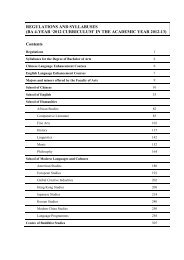Bachelor of Arts (BA) - The University of Hong Kong
Bachelor of Arts (BA) - The University of Hong Kong
Bachelor of Arts (BA) - The University of Hong Kong
Create successful ePaper yourself
Turn your PDF publications into a flip-book with our unique Google optimized e-Paper software.
281PHIL2610.Philosophy <strong>of</strong> language (6 credits)(This course is also <strong>of</strong>fered to second and third year non-<strong>BA</strong> students for inter-Faculty broadeningpurposes.)What is a language, and what is involved in knowing or understanding a language? In this course wewill see how philosophers and linguists answer such questions as the following: What can logic tell usabout the grammar <strong>of</strong> natural languages? Are human beings born with a universal grammar? Whatmakes a word meaningful? What is the difference between what we mean and what we convey whenwe say something? How does a metaphor work? Can we learn something from slips <strong>of</strong> the tongueabout the nature <strong>of</strong> language?Assessment: 100% coursework (may include in-class test).PHIL2230.Philosophy and cognitive science (6 credits)(This course is also <strong>of</strong>fered to second and third year non-<strong>BA</strong> students for inter-Faculty broadeningpurposes.)We shall look at some <strong>of</strong> the philosophical issues involved in studying minds and behaviourscientifically. We might discuss questions such as: Can we explain all mental phenomena incomputational terms? What is consciousness? What is the role <strong>of</strong> language in thinking? How usefulare neural networks in understanding the mind?Assessment: 100% coursework (may include in-class test).<strong>The</strong>re is no prerequisite for this course.This is a second or third level course, which also forms part <strong>of</strong> the BCogSc programme. It isnormally <strong>of</strong>fered every year.PHIL2460.Philosophical Chinese (6 credits)(This course is also <strong>of</strong>fered to second and third year non-<strong>BA</strong> students for inter-Faculty broadeningpurposes.)In this course, we shall learn to analyse grammatically and semantically the language used in theclassical texts <strong>of</strong> Chinese philosophy. <strong>The</strong> analysis will help us construct arguments in favour <strong>of</strong> oragainst various interpretations and translations. We briefly discuss texts from the Analects <strong>of</strong> Confucius,the Mozi, the Zhuangzi and then do a detailed analysis <strong>of</strong> the Daode Jing.Assessment: 100% coursework (may include in-class test).PHIL2070.Pragmatism (6 credits)(This course is also <strong>of</strong>fered to second and third year non-<strong>BA</strong> students for inter-Faculty broadeningpurposes.)This course is in two unequal parts. In the first and longer part, we shall study the writings <strong>of</strong> theclassical pragmatists: Peirce, Dewey and James; in the second, we shall look more briefly at some <strong>of</strong> theso-called 'neo-pragmatists' such as Quine, Davidson and Putnam. We shall then consider the question<strong>of</strong> the relationship between these two schools, and think seriously about the recent suggestion that theearlier is in fact the better.Topics to be discussed include: truth and knowledge; religion and science; and rationality, personalityand aesthetics.Assessment: 100% coursework (may include in-class test).
















